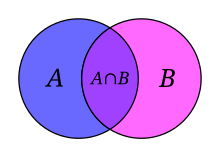集合
集(亦稱集合,英文:set)係一拃互相唔同嘅嘢,而被當做一個整體來研究。集係數學中最基本嘅概念之一。集嘅研究⸺叫做集合論⸺而家重發展緊。集合論喺 19 世紀尾至開始有,但係到而家喺數學已經無所不在;集合論可以用來做數學嘅一種基礎,由佢可以導出差唔多全部數學。數學教育入面,集合論嘅基本原素(例如溫氏圖)細細個就可以學,但係深入啲嘅嘢(例如ZF集合論)喺大學至會教。
喺哲學,集通常都被認為係抽象嘅嘢[1][2][3][4],只係佢喺物質界有實例,例如:當我哋講 「嗰啲杯」("the cups")嘅時候檯面嗰三隻杯就係實例,又或者喺黑板上寫咗一對開閂大括弧括住某啲符號又係實例,等等。但係支持數學實在論嘅人,例如 Penelope Maddy,就認為集合係實在嘅嘢。

定義
[編輯]康托喺佢嘅 《Beiträge zur Begründung der transfiniten Mengenlehre》 開頭咁樣定義「集」:
德文:Unter einer ‚Menge‘ verstehen wir jeder Zusammenfassung M von bestimmten wohlunterschiedenen Objecten m unsrer Anschauung oder unseres Denkens (welche die ‚Elemente’ von M genannt werden) zu einem Ganzen.[5]:481
粵譯:「集」 我哋可以理解做任何一個由肯定有分別嘅某啲物件 m⸺無論係感知到抑或想像中嘅嘢⸺(叫做 M 嘅 「元素」)所整合而成嘅一個整體 M。[6]
一個集嘅元素,又叫「成員」,係乜都得:數、人、字母、第啲集,諸餘此類;集通常都用大楷拉丁字母來代表。「A 等於 B」即係話佢哋嘅成員完全一樣(即係 A 入面嘅每個成員,亦係 B 嘅成員,反之亦然)。
集唔似「多重集」,集入面每一成員都係單丁,冇兩樣嘢係一模一樣(identical),而任何集嘅運算(operations)都會維持呢樣性質;集亦都唔似序列(sequence)或者元組(tuple),集嘅定義唔計成員嘅次序。
參考資料
[編輯]- ↑ Rosen, Gideon. "Abstract Objects". 出自 Zalta, Edward N. (編). The Stanford Encyclopedia of Philosophy (2006年春版).
- ↑ Partee, Barbara Hall; ter Meulen, Alice G. B. "Specification of Sets". Mathematical Methods in Linguistics. Dordrecht, Netherlands: Kluwer Academic. p. 7.
- ↑ Brown, James Cooke. "Sets and Multiples". Lognet. 95 (2).
- ↑ Goldstein, Laurence (1996). "Representation and geometrical methods of problem solving". 出自 Peterson, Donald (編). Forms of Representation: an Interdisciplinary Theme for Cognitive Science. Exeter: Intellect Books. p. 79.
- ↑ Cantor, Georg (1895). "Beiträge zur Begründung der transfiniten Mengenlehre". Mathematische Annalen. 46: 481–512. doi:10.1007/bf02124929. 歸檔時間2011年6月10號. 喺2022年10月2號搵到.
{{cite journal}}: CS1 maint: bot: original URL status unknown (link) - ↑ 參考 Dauben, p. 170 嘅英譯
